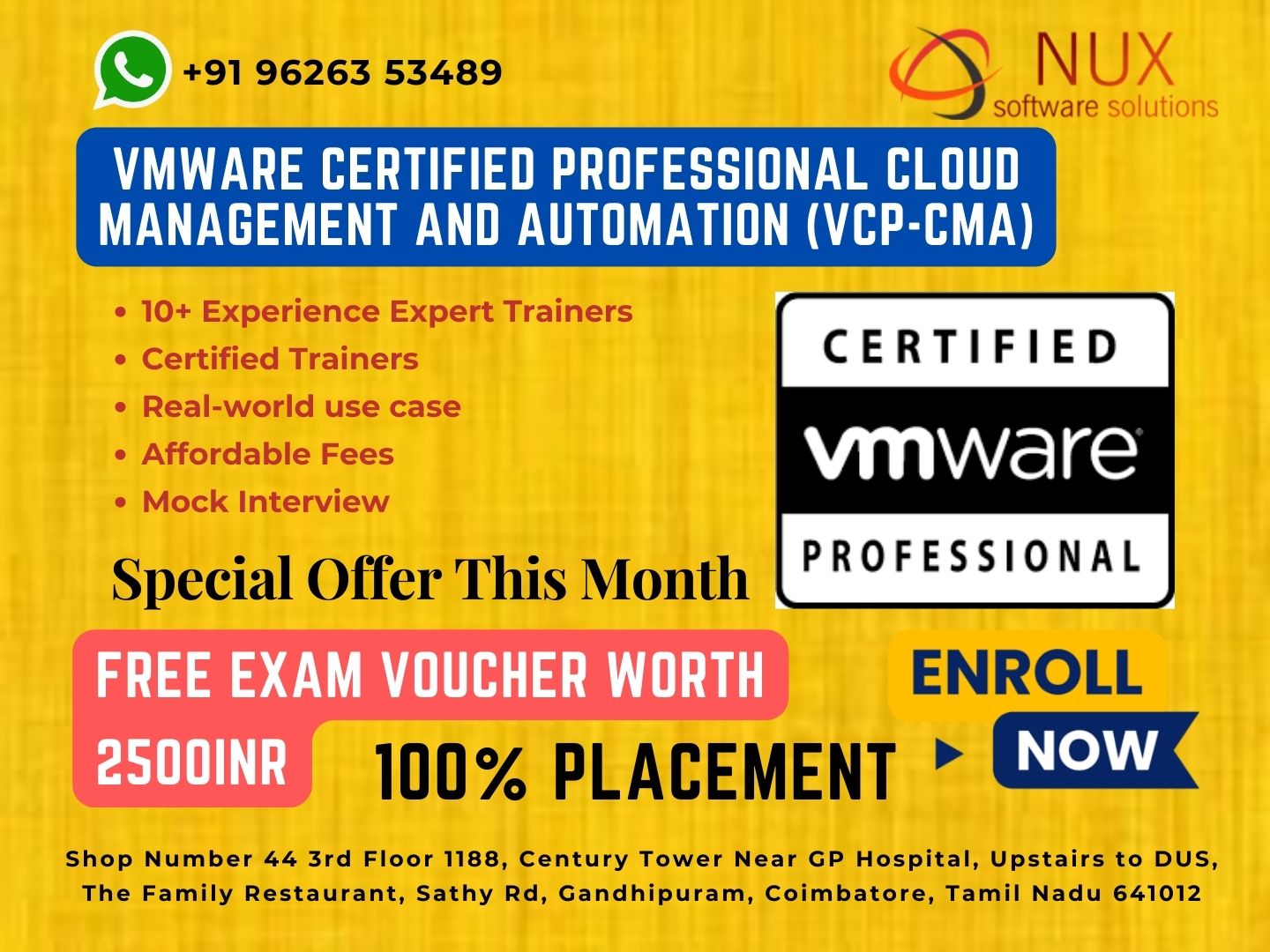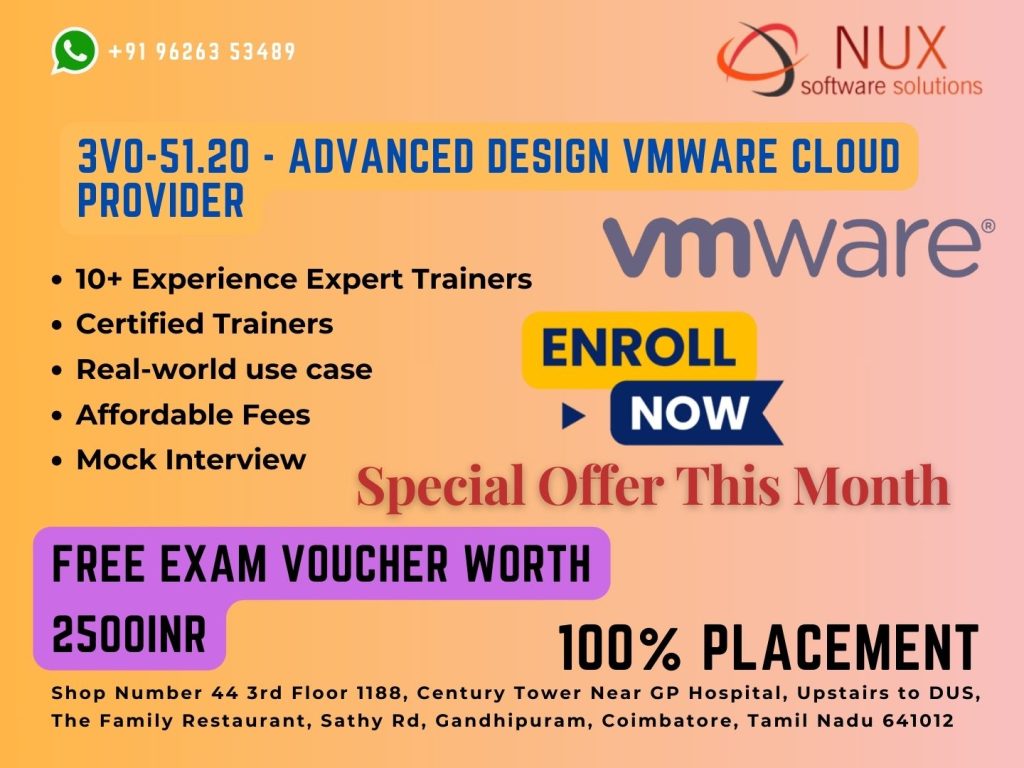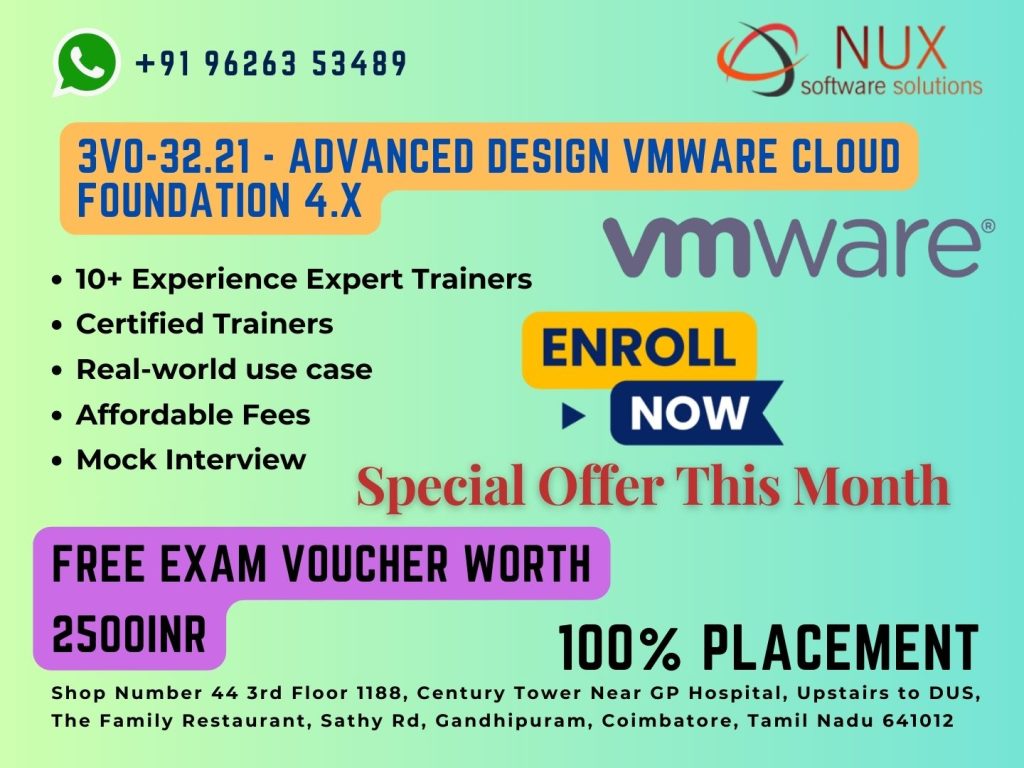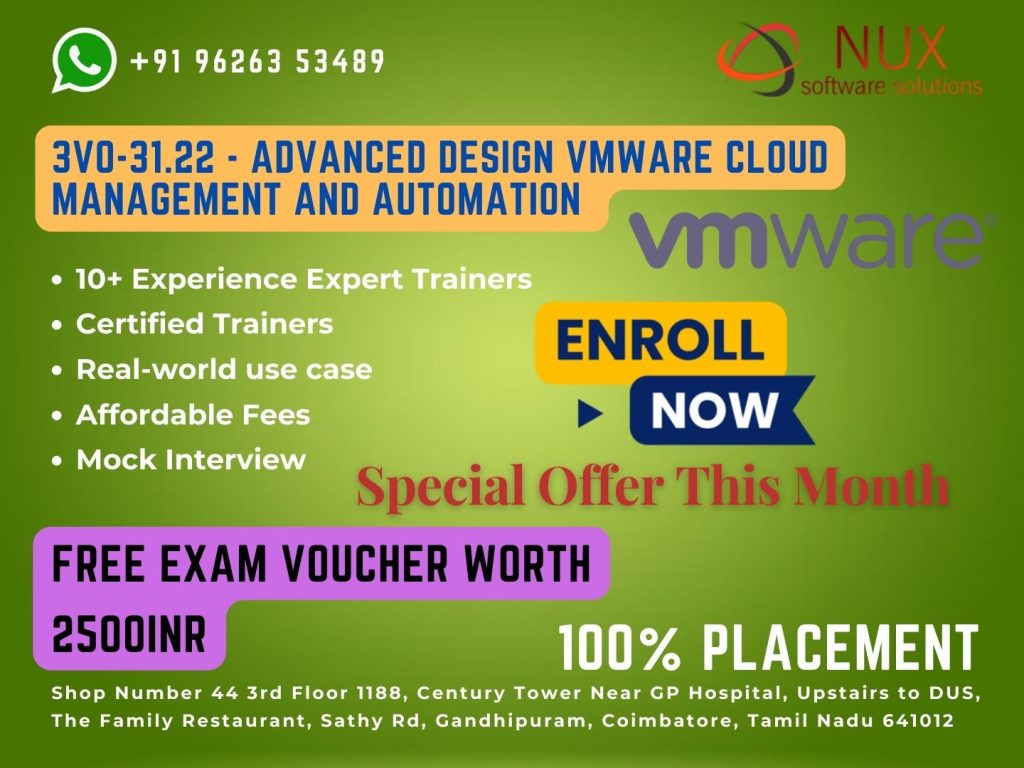VMware Certified Professional Cloud Management And Automation (VCP-CMA) Training and Certification

Course Overview
The VCP-CMA (VMware Certified Professional – Cloud Management and Automation) certification training is designed for IT professionals who want to build skills in automating cloud infrastructure provisioning and operations using the VMware vRealize Suite.
This hands-on course focuses on VMware vRealize Automation (vRA), vRealize Orchestrator (vRO), vRealize Operations (vROps), and vRealize Log Insight. Participants will learn how to build and manage self-service cloud portals, automate lifecycle processes, and monitor performance and compliance across hybrid cloud environments.
The course also prepares participants for the VCP-CMA certification exam, validating the ability to deliver secure, consistent infrastructure and applications.
Why Choose This Course
Gain end-to-end expertise in cloud infrastructure automation and monitoring
Learn to build intelligent, policy-driven workflows using vRA and vRO
Understand how to deliver Infrastructure as a Service (IaaS) and Application as a Service (AaaS)
Strengthen your skills for multi-cloud automation, DevOps integration, and governance
Prepare for a highly respected VMware certification recognized across industries
Who Should Enroll
Cloud automation engineers and VMware administrators
System architects designing hybrid cloud solutions
DevOps professionals and platform engineers
IT operations staff managing cloud, containers, and virtualized workloads
Candidates pursuing the VCP-CMA certification track
Skills You Will Gain
Deploying and configuring vRealize Automation (vRA) 8.x and Orchestrator (vRO)
Designing Cloud Templates, Service Broker catalogs, and approval policies
Automating infrastructure provisioning across vSphere, AWS, Azure, and GCP
Creating day-2 actions, integrations with Ansible, Terraform, and ITSM tools
Monitoring and analyzing performance with vRealize Operations Manager (vROps)
Centralized log management and alerting with vRealize Log Insight
Implementing governance, cost control, and security policies across environments
Career Opportunities
Cloud Automation Engineer
VMware vRealize Platform Specialist
DevOps Automation Consultant
Hybrid Cloud Engineer
Infrastructure as Code (IaC) Specialist
The VCP-CMA certification is valued by enterprises in cloud hosting, IT services, banking, telecom, and DevOps-centric organizations.
Become a Leader in Cloud Infrastructure Automation
The VCP-CMA certification equips you with the skills to deliver consistent infrastructure across private and public clouds using VMware’s leading cloud management tools.
Enroll in VMware VCP-CMA Training at Linux Training Center, Coimbatore
VMware Certified Professional Cloud Management And Automation (VCP-CMA) Syllabus
Modules
Architecture and Technologies
- Describe the architecture of vRealize Automation (Kubernetes pods, Workspace ONE Access, Lifecycle Manager)
- Differentiate between vRealize Automation vs vRealize Automation cloud
- Describe the services offered by vRealize Automation (Cloud Assembly, Service Broker, Code Stream, Orchestrator, and SaltStack Config)
Products and Solutions
Planning and Designing
Installing, Configuring, and Setting Up
- Describe the different types of vRealize Automation deployments (standard vs. clustered, vRA Envrion Scale Out)
- Prepare the pre-requisites for the installation (DNS, NTP, Service Accounts etc.)
- Perform a simple installation using vRealize Easy Installer
- Configure vRealize Automation using Quick Start
- Perform manual installation using Lifecycle Manager (Workspace ONE Access and vRealize Automation and vRA Envrion Scale Out)
- Configure identity sources (add a directory)
- Configure identity and access management (RBAC)
- Set up Cloud Accounts (NSX Constructs)
- Add Cloud Zones
- Add Projects
- Add Image Mappings
- Add Flavor Mappings
- Add Network Profiles
- Add Storage Profiles
- Describe different types of basic integrations available with vRealize Automation ("out of the box")
- Integrate vRealize Automation with vRealize Operations (Native Integration and Dashboards)
- Describe the Onboarding Process
- Describe ABX
- Describe Different Types of Tags in vRealize Automation
- Configure Capability Tags
- Install SaltStack Config using vRealize Suite Lifecycle Manager
- Create Cloud Template to Deploy Minions
- Pre-requisites for Configuring Multi-tenancy
- Configure Code Stream Endpoints and Basic Pipelines
- Describe the Use Case of Integrating Terraform with vRA
Performance-tuning, Optimization, and Upgrades
Troubleshooting and Repairing
- Collect log bundles
- Describe "vracli" commandlet options
- Describe "kubectl" (vRA Appliance) commandlet options
- Troubleshoot vRealize Automation configuration errors (Cloud Zone, tags, YAML, etc.)
- Troubleshoot provisioning errors
- Monitor deployments (provisioning diagram)
- Monitor vRO workflow execution (extensibility and event logs)
Administrative and Operational Tasks
- Manage the Identity and Access Management tab (vRA organization and service roles)
- Manage Cloud Accounts
- Manage Cloud Zones
- Manage Projects
- Manage Image Mappings
- Manage Flavor Mappings
- Manage Capability and Constraint Tags
- Manage Storage Profiles
- Manage Network Profiles
- Create and Manage Cloud Templates (Cloud Templates Inputs, YAML file and its syntax, NSX-T On-Demand Network Contructs)
- Create and manage Cloud Template Versions
- Manage Extensibility/Subscription (ABX/vRealize Orchestrator)
- Deploy Catalog items
- Manage deployments
- Describe Kubernetes clusters (Kubernetes zone)
- Customize a deployment using CloudConfig/Cloud-InIt
- Create Service Broker Content Sources
- Configure Content Sharing
- Create and Manage Custom Forms
- Manage Policies (definition and enforcement)
- Manage notifications (email servers)
- Manage Virtual Private Zones (VPZs)



